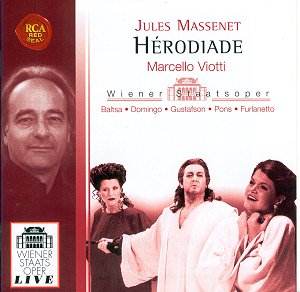Hérodiade was a high point in Massenetís
creative career. It was first performed in Brussels on 19 December 1881.
A crowded train of Massenet fans travelled from Paris for the premiere.
They were not disappointed; it was a triumph beyond their expectations
and, indeed, Hérodiade was given in Brussels 55 times
the first year. In the Massenet opera cannon, Hérodiade
comes between Le Roi de Lahore (1877) and his greatest success,
Manon (1884). It taps a rich and sustained vein of melody.
Hérodiade is somewhat different to Oscar
Wildeís vision of Salomé. In Massenetís opera she had been deserted
as a child by her mother, Hérodiade who is reviled by John the
Baptist for her forbidden incestuous love for Herod. (Herod had taken
Hérodiade, the wife of his brother, as his own). Now, their love
cooled, Herod is lusting after Salomé not knowing that the younger
woman is his wifeís daughter. But Salomé is in love with John
the Baptist (and he, in turn, realises he has tender feelings for her)
and she pleads for his life when the Jewish priests and the Roman Tetrarch,
Vitellius, condemn him. In the Massenet opera Salomé does not
shed those veils: she is in fact a good girl, torn between hatred for
her motherís desertion and the need for her affection. Far from asking
for Johnís head on a platter she wants to die for him!
This live Austrian radio recording from the Wiener
Staatsoper has great power and immediacy. The recorded sound is very
good. As one might expect the Middle Eastern setting gave Massenet every
opportunity for imaginative exotic harmonies and orchestrations. He
seized every chance. There are majestic Roman marches with stirring
fanfares, zealous Jewish choruses, and sacred dances and atmospheric
and evocative set pieces. Placido Domingo is on top form, vehement in
his derision of the iniquitous royals, noble and stoic in his defiance
of them, and in defence of his faith, and tender in his acceptance of
Saloméís affections (although his returned love for her is of
the purest). Agnes Baltsa in the title role rages and shreds the scenery
in her jealous rages against her errant husband. Juan Pons treads very
well the fine line between conviction and caricature as the lustful
and ultimately exasperated Herod while Nancy Gustafson is an appealing
Salomé torn between revulsion for Hérodiade and the need
for her love.
A gripping production of one of Massenetís best operas
full of passion and melody with Domingo on top form supported by a strong
cast.
Ian Lace


